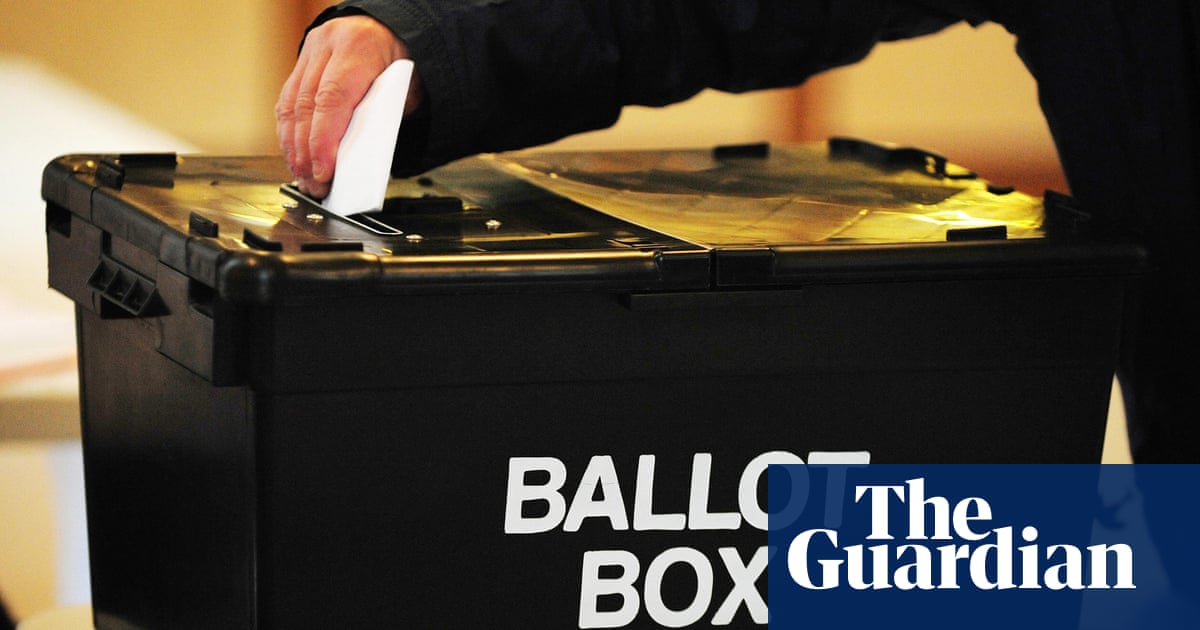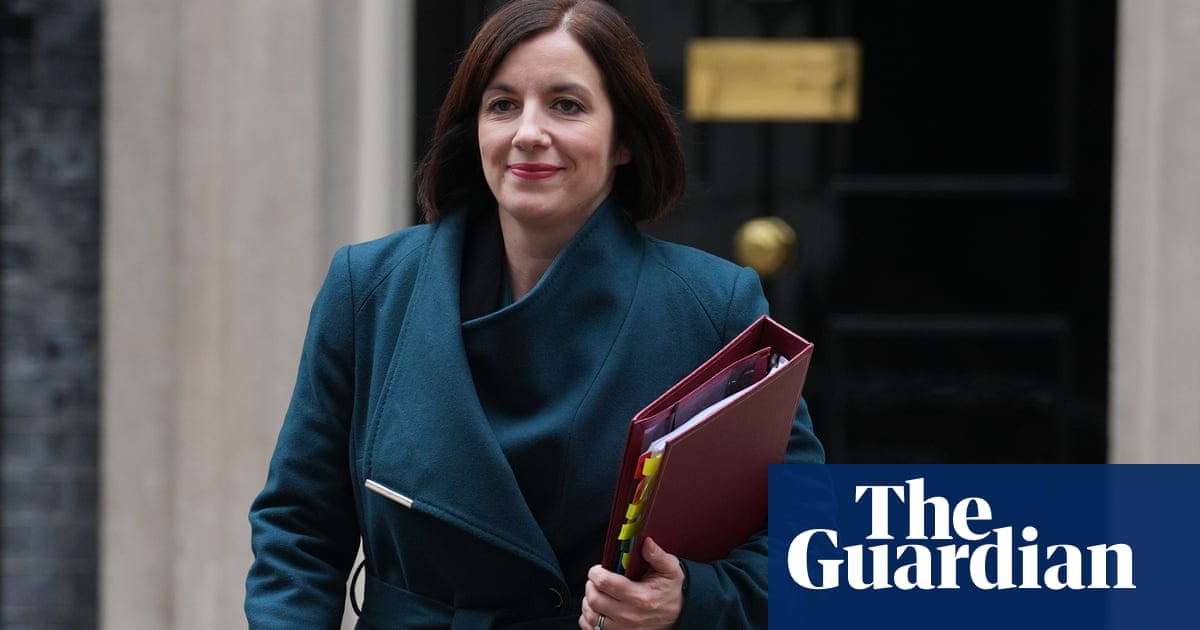Jess Phillips says guidance intends to ensure victims know the identity of online stalkers as soon as possible
Good morning. Jess Phillips, the minister for safeguarding and violence against women and girls, was the government voice on the morning broadcast round. She says she is unveiling six measures to protect the victims of stalking, including “right to know” guidance intended to ensure that the police tell victims the identity of online stalkers as soon as they can. Speaking on Times Radio, Phillips said:
I have been a victim of stalking, and I wasn’t told [the identity of the stalker]. I didn’t have the right to know. And in most of the cases of my stalkers, they made it clear who they were as part of their desire to control and frighten me. I’m afraid to say that I’ve had more than one in my life.
Phillips also cited the case of the activist and former Coronation Street actor Nicola Thorp who was stalked online by someone who set up almost 30 social media accounts to send her violent and threatening messages. Phillips said:
This was a case raised by Nicola Thorp, where somebody had been stalking her over multiple identities online, and when they said the police told her that they’d found out who it was, they then told her that they couldn’t tell her who it was.
And so everybody became her stalker – the person she was sat next to on the street – and already, when you’re living through something as harrowing as somebody stalking you and making you feel frightened and anxious, the idea that then you have to distrust all of the people around you as well just seems like a terrible added burden … and so that is what we’re going to eliminate.
I will post more on the package of measures shortly.
Otherwise, it’s a mixed, but busyish day. Here is the agenda.
Morning: Keir Starmer chairs cabinet.
10.50am: Starmer meets Kyriakos Mitsotakis, the Greek prime minister, in Downing Street.
11.30am: Downing Street holds a lobby briefing.
11.30am: Rachel Reeves, the chancellor, takes questions in the Commons. She is expected to confirm the appointment of Tom Hayhoe, a former Conservative cabinet adviser, as her Covid corruption commissioner.
After 12.30pm: MPs debate the bill implementing the increase in employers’ national insurance announced in the budget.
2.30pm: Stephen Parkinson, the director of public prosecutions, gives evidence to the Commons justice committee.
4.45pm: Reeves gives a speech and takes part in a Q&A at the Yorkshire Post’s Great Northern conference.
If you want to contact me, please post a message below the line or message me on social media. I can’t read all the messages BTL, but if you put “Andrew” in a message aimed at me, I am more likely to see it because I search for posts containing that word.
If you want to flag something up urgently, it is best to use social media. You can reach me on Bluesky at @andrewsparrowgdn. The Guardian has given up posting from its official accounts on X but individual Guardian journalists are there, I have still have my account, and if you message me there at @AndrewSparrow, I will see it and respond if necessary.
I find it very helpful when readers point out mistakes, even minor typos. No error is too small to correct. And I find your questions very interesting too. I can’t promise to reply to them all, but I will try to reply to as many as I can, either BTL or sometimes in the blog.
Key events Show key events only Please turn on JavaScript to use this feature
Opposition parties join forces to oppose employers' national insurance increase
MPs will vote later today on the second reading of the national insurance contributions (secondary class 1 contributions) bill – the legislation implementing the big rise in employers’ national insurance announced in the budget. This proposal has managed to unite all the main opposition parties, which are opposed.
The Conservatives and the Liberal Democrats have tabled separate amendments opposing the bill. A third amendment that would block it has been tabled jointly by the SNP and Plaid Cymru, and signed by the Green party.
The four main parties tabling the amendments have all released statements ahead of the vote. For the Tories, Mel Stride, the shadow chancellor, said:
Broken promises have consequences. This national insurance increase means lower wages, fewer jobs, the closure of businesses and lower growth.
Daisy Cooper, the Lib Dem Treasury spokesperson,
This government rightly says that its big economic mission is to drive up growth but this tax rise will undermine growth not unleash it.
Small businesses are the engine of growth but these taxes will make it more expensive for them to employ people and harder to expand.
Health and wealth are two sides of the same coin but for community health providers like pharmacies, GPs and our care sector, it will pile on the cost pressure, leaving patients to suffer.
There is no doubt the Conservatives left an enormous mess but this is not the way to fix it. We have said time and again that the government should have looked to the big banks and social media giants to fund our NHS and other vital public services.
Dave Doogan, the SNP Westminster economy spokesperson, said:
Two months on from the UK budget and it is clearer by the day that not only was Labour’s massive national insurance tax hike ill-thought out, but that Scotland was clearly an afterthought.
Ben Lake, the Plaid Cymru Treasury spokesperson, said:
The UK government had the opportunity to explore more progressive and fairer ways to raise revenue – such as equalising capital gains tax with income tax or introducing a wealth tax. Instead, they opted for a path that shifts the burden onto those least able to bear it, at a time of significant financial strain on public services and businesses.
Trump picks Republican mega-donor Warren Stephens as ambassador to UK
Donald Trump has picked investment banker and Republican mega-donor Warren Stephens to serve as ambassador to the UK, Alice Herman reports.
Claire Waxman, London’s independent victims’ commissioner, has welcomed the anti-stalking measures announced by the Home Office today. (See 9.50am.) A review of stalking legislation and greater use of stalking protection orders are both things she called for after her London stalking review.
Waxman said:
Too often, I hear from victims facing relentless, terrifying behaviour from stalkers, only for the police or CPS to downgrade it to a lesser offence, such as malicious communications or harassment.
It is clear the current stalking laws are failing to protect victims and I urge government to now proceed swiftly with their review in this area.

Full list of new anti-stalking measures announced by Home Office
Here is the full list of anti-stalking measures announced by the Home Office today.
-
A “right to know” should ensure that the police tell victims the identity of stalkers as soon as possible.
-
Stalking protection orders will be more widely available. The Home Office says:
These orders can ban stalkers from going within a certain distance of their victims or contacting them, and can also compel them to attend a perpetrator programme to address the root causes of their behaviour.
Currently, these can only be applied when an offender is convicted and when a protection order was in place before they went on trial. Once implemented, under new measures, courts will be given the power to impose restrictions on perpetrators after they have been convicted even if there was no protection order in place before they went on trial, stopping, for example, offenders from contacting their victims from prison. Courts will also be able to directly apply protection orders on those who have been acquitted if there is enough evidence to suggest that they are still a risk to the victim.
-
Stalking will be defined in statutory guidance, so that “proper protections are put in place for every victim of stalking”.
-
National standards for stalking perpetrator programmes will be published.
-
New data on stalking offences will be published by the Home Office.
-
The Home Office has said it will accept or partially accept all the recommendations in the “super-complaint” organised by the Suzy Lamplugh Trust in 2022 into the way police forces deal with stalking.
-
Stalking legislation will be reviewed. This will “determine whether the law could be changed to support police to better identify stalking and arrest offenders.”
Prisoners could be given stalking protection orders to stop them stalking women from jail under new plans, Phillips says
Under the package of anti-stalking measures announced today, the courts will be able to impose stalking protection orders on people in prison. Explaining why this was needed, Jess Phillips, the minister for safeguarding and violence against women and girls, told LBC:
Judges will be able to hand out stalking protection orders to people on conviction, which they currently can’t do, which will stop people being stalked by people in prison, which I’m afraid to say, is a very real thing, and it happened to me,.
I had somebody who was in prison for harming – well, seeking to harm me – and then was able to write letters to me, contact me from prison.
Phillips said she had come across “quite a lot of cases” where ex-partners in prison for crimes against their wives or girlfriends were able to stalk them online from prison and contact them from prison.
Asked how stalking affected her, Phillips said:
I think that for most victims, what you try and do is diminish it at first. You try and assume that … it’s just one of those things where it’s somebody who keeps showing advances towards you, or, you know, you live rent-free in someone’s head when you’re a politician, until the point at which it ramps up and it begins to control you. And I’m a person with quite a lot of power. So these, these crimes are usually about power and control.
Jess Phillips says guidance intends to ensure victims know the identity of online stalkers as soon as possible
Good morning. Jess Phillips, the minister for safeguarding and violence against women and girls, was the government voice on the morning broadcast round. She says she is unveiling six measures to protect the victims of stalking, including “right to know” guidance intended to ensure that the police tell victims the identity of online stalkers as soon as they can. Speaking on Times Radio, Phillips said:
I have been a victim of stalking, and I wasn’t told [the identity of the stalker]. I didn’t have the right to know. And in most of the cases of my stalkers, they made it clear who they were as part of their desire to control and frighten me. I’m afraid to say that I’ve had more than one in my life.
Phillips also cited the case of the activist and former Coronation Street actor Nicola Thorp who was stalked online by someone who set up almost 30 social media accounts to send her violent and threatening messages. Phillips said:
This was a case raised by Nicola Thorp, where somebody had been stalking her over multiple identities online, and when they said the police told her that they’d found out who it was, they then told her that they couldn’t tell her who it was.
And so everybody became her stalker – the person she was sat next to on the street – and already, when you’re living through something as harrowing as somebody stalking you and making you feel frightened and anxious, the idea that then you have to distrust all of the people around you as well just seems like a terrible added burden … and so that is what we’re going to eliminate.
I will post more on the package of measures shortly.
Otherwise, it’s a mixed, but busyish day. Here is the agenda.
Morning: Keir Starmer chairs cabinet.
10.50am: Starmer meets Kyriakos Mitsotakis, the Greek prime minister, in Downing Street.
11.30am: Downing Street holds a lobby briefing.
11.30am: Rachel Reeves, the chancellor, takes questions in the Commons. She is expected to confirm the appointment of Tom Hayhoe, a former Conservative cabinet adviser, as her Covid corruption commissioner.
After 12.30pm: MPs debate the bill implementing the increase in employers’ national insurance announced in the budget.
2.30pm: Stephen Parkinson, the director of public prosecutions, gives evidence to the Commons justice committee.
4.45pm: Reeves gives a speech and takes part in a Q&A at the Yorkshire Post’s Great Northern conference.
If you want to contact me, please post a message below the line or message me on social media. I can’t read all the messages BTL, but if you put “Andrew” in a message aimed at me, I am more likely to see it because I search for posts containing that word.
If you want to flag something up urgently, it is best to use social media. You can reach me on Bluesky at @andrewsparrowgdn. The Guardian has given up posting from its official accounts on X but individual Guardian journalists are there, I have still have my account, and if you message me there at @AndrewSparrow, I will see it and respond if necessary.
I find it very helpful when readers point out mistakes, even minor typos. No error is too small to correct. And I find your questions very interesting too. I can’t promise to reply to them all, but I will try to reply to as many as I can, either BTL or sometimes in the blog.

.png) 1 month ago
13
1 month ago
13













































